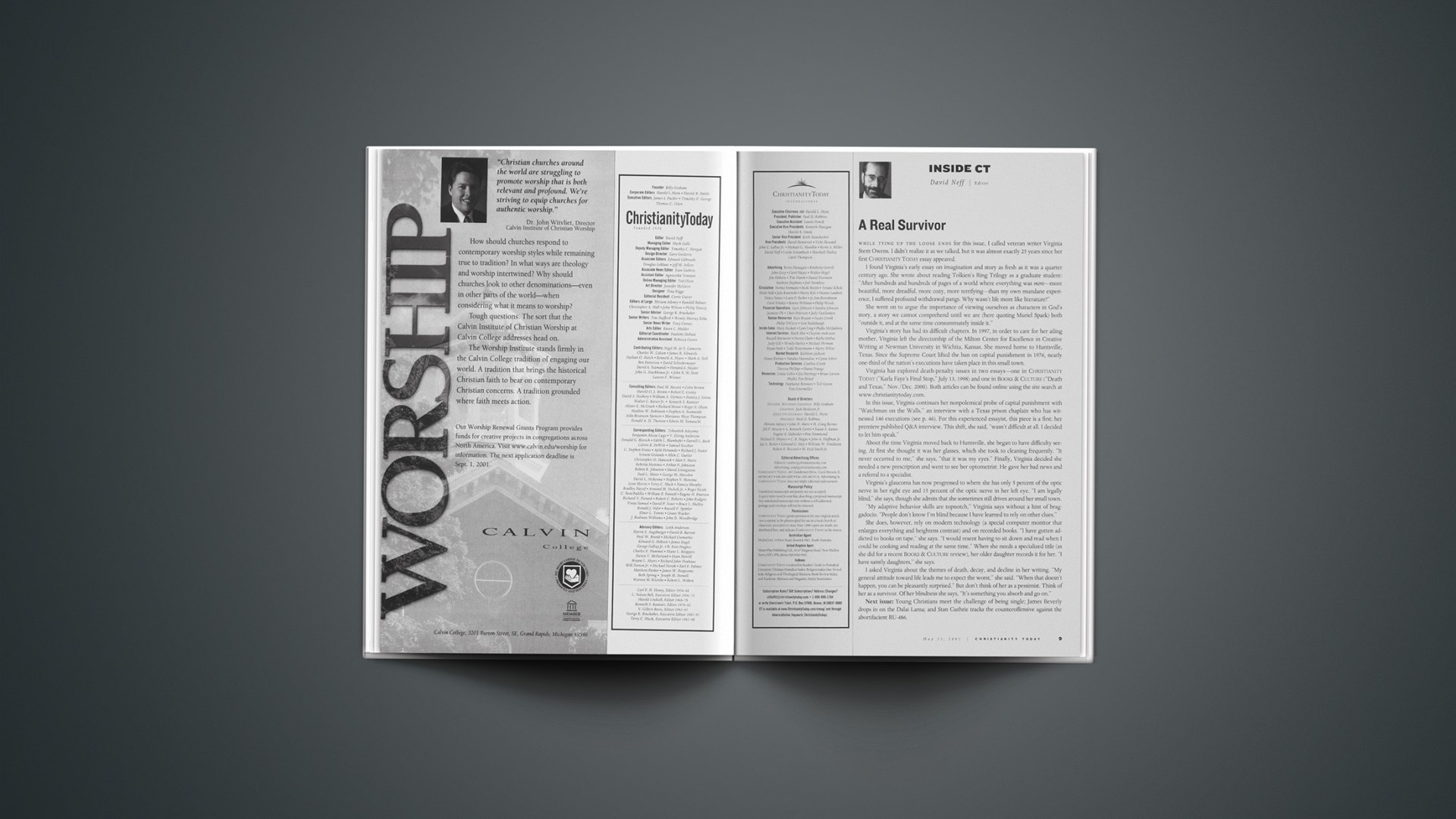I found Virginia’s early essay on imagination and story as fresh as it was a quarter century ago. She wrote about reading Tolkien’s Ring Trilogy as a graduate student: “After hundreds and hundreds of pages of a world where everything was more—more beautiful, more dreadful, more cozy, more terrifying—than my own mundane experience, I suffered profound withdrawal pangs. Why wasn’t life more like literature?”
She went on to argue the importance of viewing ourselves as characters in God’s story, a story we cannot comprehend until we are (here quoting Muriel Spark) both “outside it, and at the same time consummately inside it.”
Virginia’s story has had its difficult chapters. In 1997, in order to care for her ailing mother, Virginia left the directorship of the Milton Center for Excellence in Creative Writing at Newman University in Wichita, Kansas. She moved home to Huntsville, Texas. Since the Supreme Court lifted the ban on capital punishment in 1976, nearly one-third of the nation’s executions have taken place in this small town.
Virginia has explored death-penalty issues in two essays—one in Christianity Today (“Karla Faye’s Final Stop,” July 13, 1998) and one in Books & Culture (“Death and Texas,” Nov./Dec. 2000).
In this issue, Virginia continues her nonpolemical probe of capital punishment with “Watchman on the Walls,” an interview with a Texas prison chaplain who has witnessed 146 executions (see p. 46). For this experienced essayist, this piece is a first: her premiere published Q&A interview. This shift, she said, “wasn’t difficult at all. I decided to let him speak.”
About the time Virginia moved back to Huntsville, she began to have difficulty seeing. At first she thought it was her glasses, which she took to cleaning frequently. “It never occurred to me,” she says, “that it was my eyes.” Finally, Virginia decided she needed a new prescription and went to see her optometrist. He gave her bad news and a referral to a specialist.
Virginia’s glaucoma has now progressed to where she has only 5 percent of the optic nerve in her right eye and 15 percent of the optic nerve in her left eye. “I am legally blind,” she says, though she admits that she sometimes still drives around her small town.
“My adaptive behavior skills are topnotch,” Virginia says without a hint of braggadocio. “People don’t know I’m blind because I have learned to rely on other clues.”
She does, however, rely on modern technology (a special computer monitor that enlarges everything and heightens contrast) and on recorded books. “I have gotten addicted to books on tape,” she says. “I would resent having to sit down and read when I could be cooking and reading at the same time.” When she needs a specialized title (as she did for a recent Books & Culture review), her older daughter records it for her. “I have saintly daughters,” she says.
I asked Virginia about the themes of death, decay, and decline in her writing. “My general attitude toward life leads me to expect the worst,” she said. “When that doesn’t happen, you can be pleasantly surprised.” But don’t think of her as a pessimist. Think of her as a survivor. Of her blindness she says, “It’s something you absorb and go on.”
Copyright © 2001 Christianity Today. Click for reprint information.
Related Elsewhere
Virginia Stem Owens’ articles for Christianity Today and our sister publication Books & Culture include:Thanksgiving at Fair Acres | A meal with my mother and other nursing-home residents opened a small crack in their stony detachment, and gave a brief glimpse of the kingdom of heaven. (CT, Nov. 17, 2000)
Death and Texas | How a self-styled “Community Conversation” turned into an anti-conversation carried on by an anti-community. (B&C, Nov/Dec. 2000)
Walking Where Lewis Walked | My reluctant entry into the world of pilgrimage. (CT, Feb. 7, 2000)
What Shall We Do with Mother? | Poll your friends over fifty. Most of them are already wrestling with this question. (B&C, Jul/Aug 1999)
Grave Matters | I shouldn’t have let my parents talk to those funeral salesmen unchaperoned. (B&C, Mar/Apr 1999)
The Fatted Faithful | Why the church may be harmful to your waistline. (CT, Jan. 11, 1999)
Karla Faye’s Final Stop | How my hometown deals with being the execution capital of the world. (CT, July 13, 1998)
Good Friday | Part two of “The Great Reversal” (CT, March 17, 1989)
Owens’ article for the premier issue of Image, “Our Aunts’ Tables,” is also available online.










